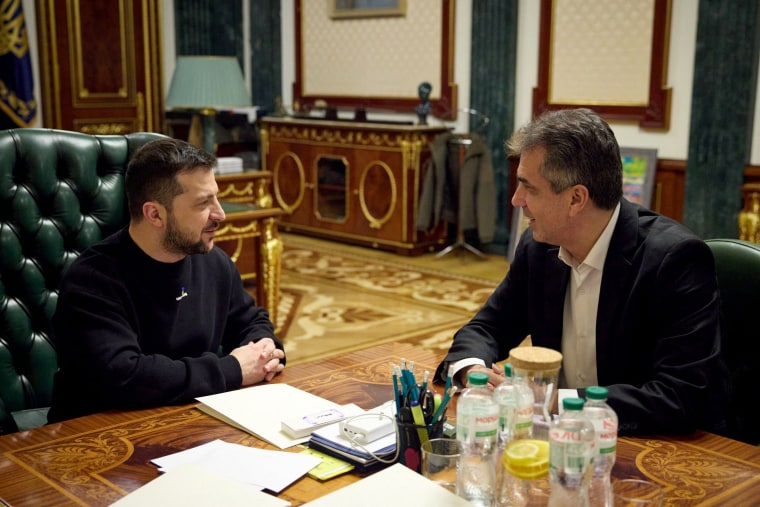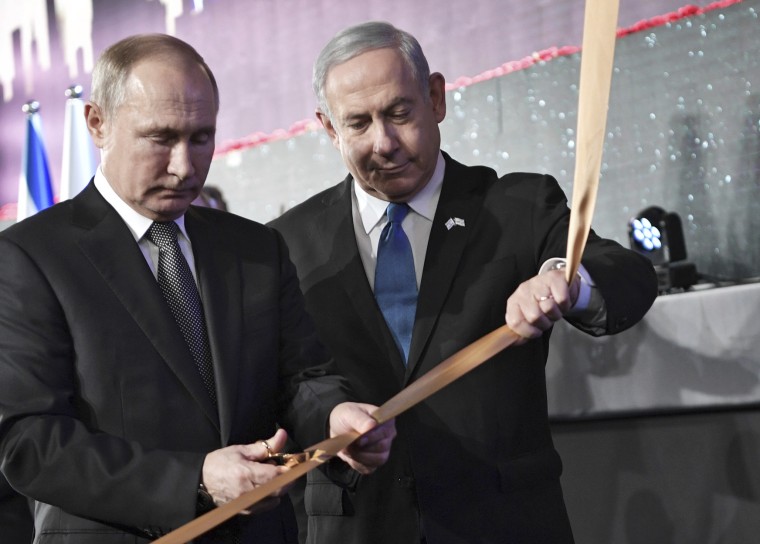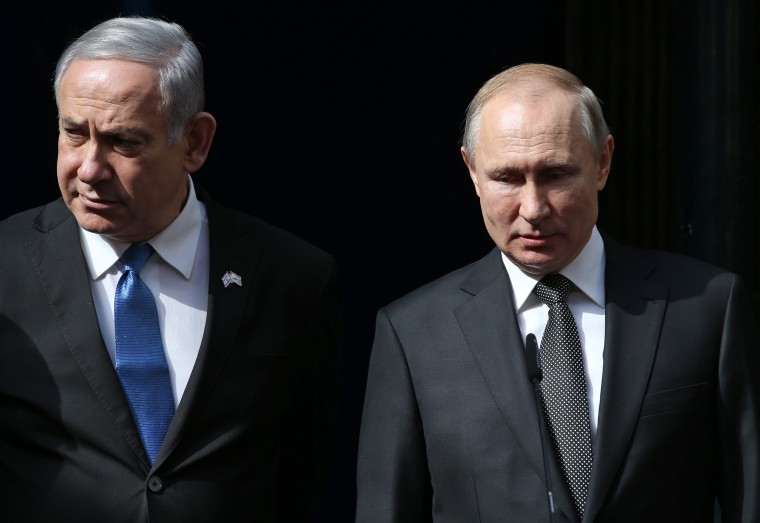JERUSALEM — Prime Minister Benjamin Netanyahu has long leaned into his relationship with Russian President Vladimir Putin, leveraging it to act as an intermediary between the Kremlin and Washington and to help secure Israel’s northern border with Syria.
What a difference 18 months makes.
Netanyahu returned to power in late December amid expectations that he would pivot Israel in the direction of Russia. He has instead shored up his country’s backing of Kyiv under pressure from Israel’s most significant ally, the U.S. Now he has to weigh alienating Putin by providing defensive arms to Ukraine, a move he has yet to agree to and which Russia has already made it clear would be a red line.
Ukrainian President Volodymyr Zelenskyy publicly asked Israel for its advanced David’s Sling system in his virtual address to the Munich Security Conference on Feb. 17, expressing confidence that Israel would eventually acquiesce.
“We do not have yet the David’s Sling from Israel, but I believe it is just temporary,” Zelenskyy said.

Ukrainian Foreign Minister Dmytro Kuleba also laid out his country’s demands when he met with his Israeli counterpart, Eli Cohen, in Kyiv on Feb. 16.
“Israel knows perfectly well the list of our military and defensive requests which we have provided … to this government, and we will be waiting for some decisions to be taken,” he said. “We are talking about the provision of the Ukrainian skies.”
Cohen, who was the first high-level Israeli official to visit Ukraine since the start of the war, went to Kyiv on a solidarity trip that included a meeting with Zelenskyy, but he left without promising defensive military help.
Senior Israeli lawmakers have already called on Netanyahu to provide Ukraine with anti-drone and anti-missile systems.
Yuli Edelstein, a member of Netanyahu’s Likud Party who heads the parliamentary Foreign Affairs and Defense Committee, traveled to Ukraine and met with Zelenskyy on Feb. 20, along with opposition legislator Ze’ev Elkin, with a message that was markedly different from Cohen’s.
They promised Zelenskyy to do everything possible to help ensure Israel sends defensive weapons.
“Israel can and should do much more than it has done so far,” they said in a statement after the meeting. “We must stop being afraid, and take an active unequivocal position in accordance with the basic moral values, as would be expected from any Western country.”
Automatic sympathy
Elkin and Edelstein both immigrated to Israel from Ukraine decades ago and say they feel automatic sympathy with its citizens under fire. But they also add that they broke ranks with their government, both from a moral position and then a policy one, given Russia’s growing military alliance with Iran, which has said it wants to see Israel wiped off the map.
Tehran has already shown its enmity to Kyiv by providing Russia with battlefield weapons such as armed drones, which Moscow has used against Ukraine, a move that has automatically tightened ties between Netanyahu and Zelenskyy.
So the strengthening of the Russian-Iranian alliance threatens the security not only of Ukraine, but also of Israel, Edelstein and Elkin said, saying both countries were now on the same side when it came to defending their citizens against Iran.
In Jerusalem at the end of January, Secretary of State Antony Blinken pointed to Russia’s growing dependence on Iran to supply weapons for the war and explicitly demanded that Israel boost its support for Kyiv.
“Tehran’s deepening ties with Moscow and the sophisticated weaponry that they’re exchanging to enable one another’s aggression are among the many reasons that we’ve raised with Israel the importance of providing support for all of Ukraine’s needs — humanitarian, economic and security — as it defends its people against Russia’s brutal war of aggression,” Blinken told reporters.
In a sign of a possible concession to Washington, Netanyahu indicated in an interview with CNN that aired immediately after Blinken’s visit that he was weighing Ukraine’s long-standing request to provide anti-drone and anti-missile technology.
“I am certainly looking into it,” Netanyahu said. In an unusually blunt statement, he also indicated that Israel was working covertly to prevent Iranian-made arms from arriving in Russia, with its regional policy of attacking Iranian targets connected to arms production or arms flow. Israel is “taking action against certain weapons development that Iran has, and Iran invariably exports them,” he said.
An example of that kind of action was most likely on display this month as Damascus blamed Israel over a rocket attack against a gathering of Syrian and Iranian technical experts in drone manufacturing, according to Reuters.
Avoiding a Russian-Israel conflict
Moscow has focused on Israel’s public actions rather than its covert ones. Foreign Ministry spokeswoman Maria Zakharova warned this month that Israel’s provision of defensive military equipment to Ukraine would lead to an “escalation of the crisis.”
Countries “supplying weapons should understand that we will consider these weapons as legitimate targets,” she said, adding that the position “is well-known to all.”
Netanyahu told NBC News in December that he wanted to avoid a Russian-Israeli war. The question of whether Netanyahu, who despite his hawkish reputation is historically loath to use the country’s full military might, should put Israel on a possible collision course with Russia has been a growing debate in Israel.
Israel’s well-understood beneficial relationship with Russia — a relationship that has been personalized by Netanyahu’s strong ties to Putin — has made many hesitant to have Netanyahu pivot fully to Ukraine.

On the security front, Russia has been Netanyahu’s partner in neighboring Syria, where it is one of President Bashar al-Assad’s most important military backers. An agreement with Israel has made it possible for the Israeli army to conduct aerial raids against Iranian-linked targets there.
“We are in a very different situation than Europe and the U.S.” when it comes to Russia, said political science professor Reuven Hazan of Jerusalem’s Hebrew University. “Israeli prime ministers know the relevance of an open dialogue with Russia when it comes to our national security.”
Zvi Magen, who first was Israel’s ambassador to Ukraine and then to Russia in the 1990s, said that if Israel were to give Ukraine weapons, especially ones that would change the balance of the conflict, it would be “going to war with Russia.”
There is the danger, Hazan said, that Russia could close the airspace over Syria, turning to a “land bridge” for the advanced weapons that Iran is trying to ship to Hezbollah in Lebanon, he said.
Israel has also been concerned by the impact on Russia’s Jewish community of 83,000 should ties be severed.
But those and other considerations appear to be giving way to the threat posed by Iran.
